Which CMS is Best for SEO in 2025? Top 14 Platforms Ranked

Choosing the best CMS for SEO is crucial for success in 2025. After managing over $2 billion in ad spend and optimizing sites generating billions in revenue, we’ve seen firsthand which platforms deliver results. Your CMS choice can make or break SEO efforts. We’ve watched million-dollar companies tank with the wrong setup.
This article provides expert recommendations focusing on flexibility, performance, and ease of use. No marketing fluff, just real data from real campaigns. Based on our experience, we’ve narrowed down the top 14 CMS platforms for SEO in 2025 that consistently help websites rank higher, drive more organic traffic, and scale with business growth.
Key Takeaways
- Methodology: How We Chose the Best CMS Platforms for SEO
- Best Overall CMS for SEO: WordPress, Webflow, Drupal
- Best for E-Commerce SEO: Shopify, Magento
- Best for Enterprise SEO: Drupal, TYPO3, Contentful
- Best Headless SEO CMS: Strapi, Storyblok, Enonic XP
- Best for Publishers & Creators: Ghost, Concrete CMS, SilverStripe
- Choosing the Right CMS for Your Business
- Future-Proofing Your SEO Strategy with the Right CMS
- Frequently Asked Questions
Methodology: How We Chose the Best CMS Platforms for SEO
We evaluated each CMS using five core criteria: technical SEO capabilities, ease of on-page optimization, scalability, community support, and real-world performance data from hundreds of managed campaigns. Each platform was categorized based on where it performs best—whether as an overall SEO solution, an e-commerce platform, or an enterprise-grade CMS. Our rankings prioritize flexibility, site speed, structured data support, and long-term SEO scalability
Overall Best CMS for SEO
These platforms combine flexibility, performance, and SEO tools to deliver results across different business sizes and technical requirements.
1. WordPress
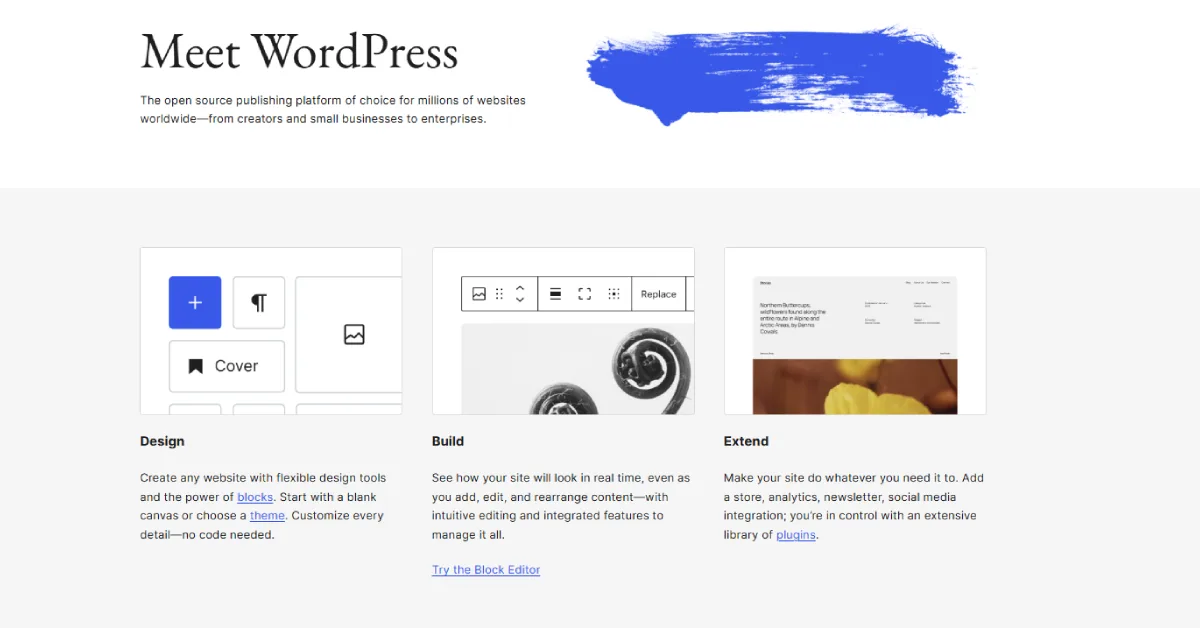
Best for: Blogs, content-driven websites, businesses of all sizes
WordPress powers 43% of all websites for good reason. It offers unmatched flexibility for SEO optimization, from simple blogs to complex enterprise sites. The platform’s open-source nature means you’re never locked into proprietary limitations that hurt your search performance. When you need complete control over your SEO destiny, WordPress delivers without compromise.
Key features:
- Extensive SEO plugins (Yoast, Rank Math, All in One SEO)
- Customizable permalinks and advanced redirect management
- Massive community and plugin ecosystem (60,000+ plugins)
- Scales from simple blogs to enterprise-level sites
- Complete control over site speed and technical SEO
2. Webflow
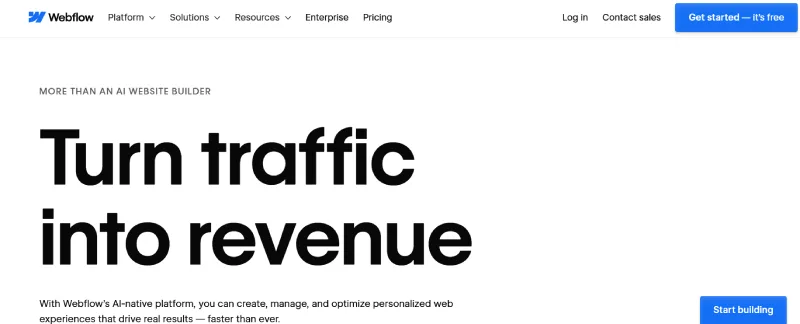
Best for: Designers and marketers wanting visual editing with SEO control
Webflow generates clean, semantic HTML that search engines love. Unlike drag-and-drop builders that create bloated code, Webflow’s visual editor produces lightweight, fast-loading pages with built-in SEO optimization tools. You get designer-level control without sacrificing technical SEO performance, making it perfect for teams that value both aesthetics and search rankings.
Key features:
- Visual editor with comprehensive SEO field controls
- Clean HTML output and optimized CSS delivery
- Automatic XML sitemaps and structured data options
- Built-in CDN and performance optimization
- No-code interactions that don’t hurt page speed
3. Drupal

Best for: Enterprise, government, and high-security websites
Drupal handles complex content architectures and massive traffic loads without breaking a sweat. Its advanced taxonomy system and multilingual capabilities make it the go-to choice for organizations that need enterprise-grade SEO at scale. When security, performance, and complex content relationships matter more than ease of use, Drupal dominates the enterprise space.
Key features:
- Advanced taxonomy system and multilingual SEO support
- Comprehensive SEO modules for schema, caching, and redirects
- Enterprise-grade security and user permission systems
- Custom content types and field-level SEO control
- High-performance caching and scalability features
Best CMS for E-Commerce SEO
E-commerce sites need platforms that handle product catalogs, user-generated content, and complex site structures while maintaining fast page speeds.
4. Shopify

Best for: Small to mid-size e-commerce businesses
Shopify strikes the perfect balance between simplicity and SEO power. You get built-in product schema, fast hosting, and SEO-friendly URLs without needing a technical team. Plus, their app ecosystem fills any gaps in functionality. When you need to focus on selling products instead of managing servers, Shopify handles the technical SEO heavy lifting.
Key features:
- Built-in product schema and rich snippets
- SEO-optimized URL structures and canonical tags
- Fast, secure hosting with global CDN
- Mobile-optimized themes and Core Web Vitals compliance
- Extensive app ecosystem for advanced SEO features
5. Magento (Adobe Commerce)
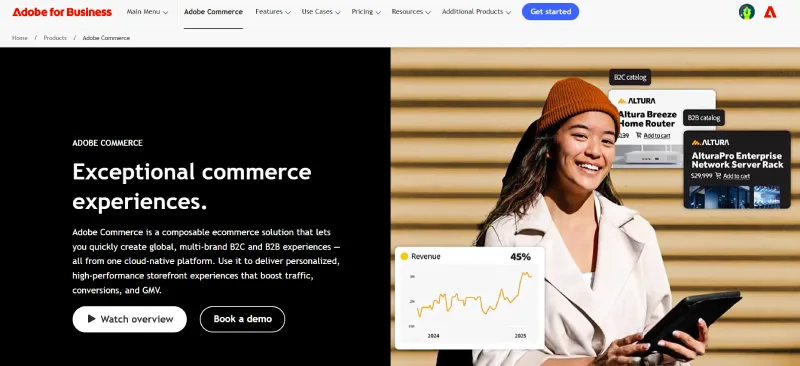
Alt Text: Magento CMS homepage screenshot showing Adobe Commerce platform with enterprise e-commerce SEO and product catalog tools.
Best for: Large, enterprise-level e-commerce stores
Magento gives you complete control over your SEO destiny. From custom URL structures to advanced product catalog management, it handles thousands of products while maintaining search engine visibility. Just be ready for the learning curve. When you’re managing complex product catalogs with multiple attributes, categories, and variants, Magento’s flexibility becomes essential for maintaining SEO performance at scale.
Key features:
- Advanced SEO-friendly product catalog management
- Custom URL structures and comprehensive metadata control
- Multi-store SEO management from a single dashboard
- Scalable architecture for thousands of products
- Advanced layered navigation with SEO-friendly filtering
Best CMS for Enterprise SEO
Enterprise platforms must handle complex workflows, multiple stakeholders, and massive content volumes while maintaining security and performance.
6. HubSpot CMS Hub
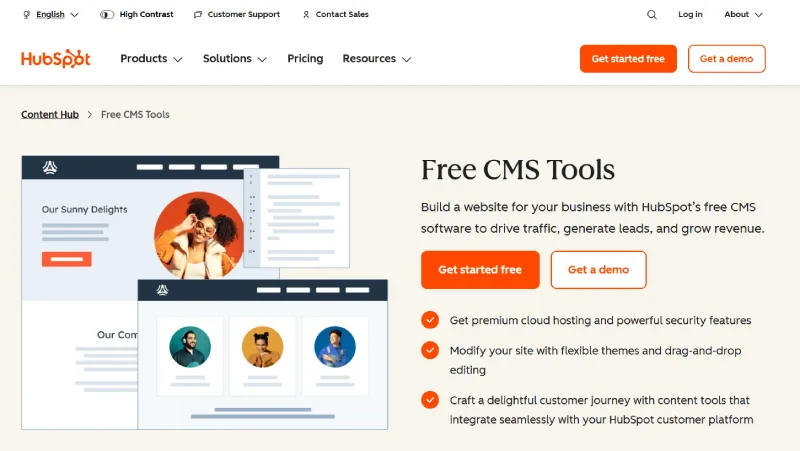
Best for: Marketing-driven companies needing CRM integration
HubSpot connects your content directly to your marketing funnel. Built-in SEO recommendations help your team create optimized content, while CRM integration lets you track which pages actually drive revenue. When your marketing team needs to prove content ROI and connect every page view to actual business outcomes, HubSpot’s integrated approach delivers measurable results.
Key features:
- Built-in SEO recommendations and content optimization tools
- Seamless CRM and marketing automation integration
- Secure, managed hosting with automatic SSL certificates
- Drag-and-drop editor with SEO guardrails
- Advanced analytics connecting content performance to revenue
7. Contentful
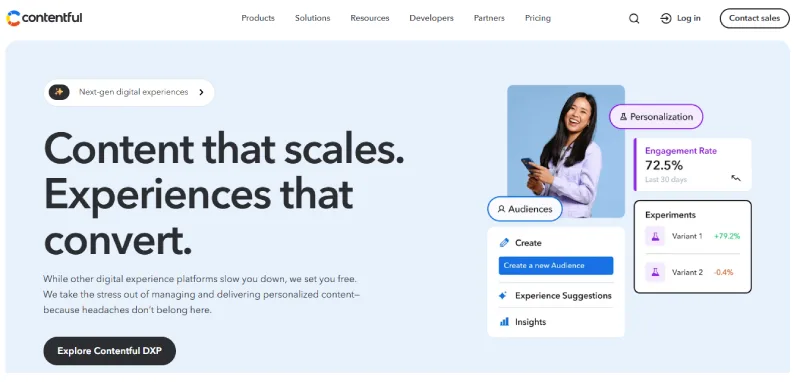
Best for: Headless, API-first content delivery
Contentful delivers content across any channel, from websites to mobile apps. Its API-first approach means faster page loads and better user experience, two critical ranking factors that traditional CMSs often struggle with. When you need to publish content everywhere while maintaining consistent SEO optimization, Contentful’s omnichannel approach gives you the flexibility to reach audiences wherever they consume content.
Key features:
- API-first architecture enabling headless delivery
- Scalable content models with SEO metadata support
- Multi-language content management and localization
- Real-time content synchronization across channels
- Developer-friendly GraphQL and REST APIs
8. TYPO3
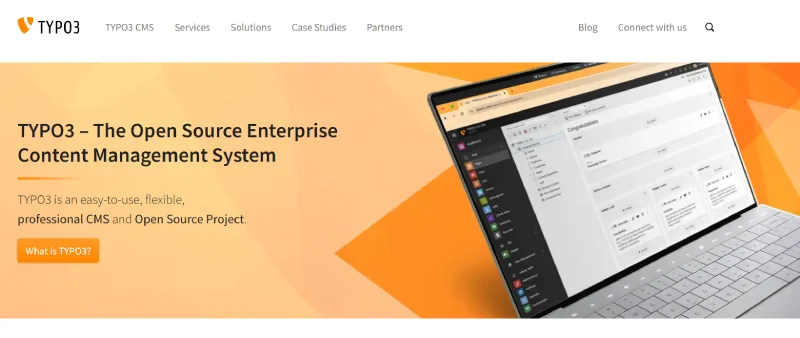
Best for: Large multinational organizations
TYPO3 excels at complex, multilingual websites with strict security requirements. Its advanced permission system and localization features make it ideal for global organizations that need consistent SEO across multiple markets. When you’re managing content in dozens of languages with complex editorial workflows, TYPO3’s enterprise-grade content management prevents SEO inconsistencies that hurt international search performance.
Key features:
- Native multilingual support with advanced localization tools
- Enterprise security protocols and granular user permissions
- Flexible extension system for custom SEO requirements
- Advanced workflow management for content approval
- Multi-site management from a centralized interface
Best Headless & Hybrid CMS for SEO
Headless platforms separate content management from presentation, enabling faster, more flexible websites that perform better in search results.
9. Strapi
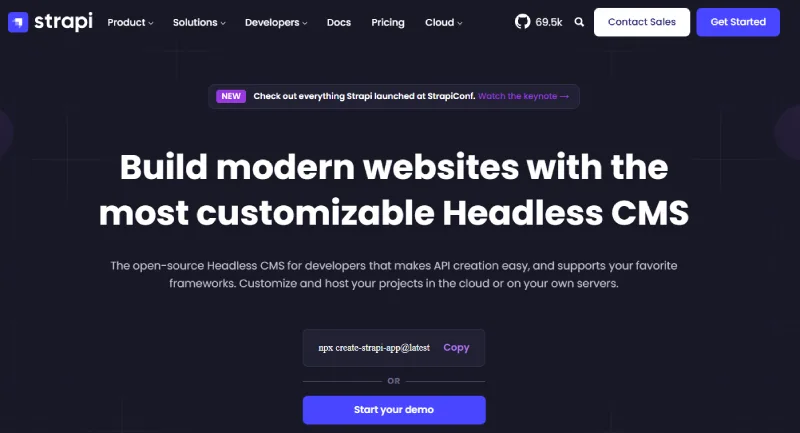
Best for: Developers wanting full control
Strapi gives developers complete freedom to optimize for search engines. You can build lightning-fast frontends while maintaining powerful content management capabilities. Perfect for teams that want to push the boundaries of web performance. When standard CMS platforms limit your technical SEO implementation, Strapi’s open-source flexibility lets you optimize every aspect of content delivery and site architecture.
Key features:
- Open-source codebase with unlimited customization options
- RESTful and GraphQL APIs for flexible content delivery
- Granular permissions system and role-based access control
- Plugin architecture for extending SEO functionality
- Self-hosted or cloud deployment options
10. Storyblok
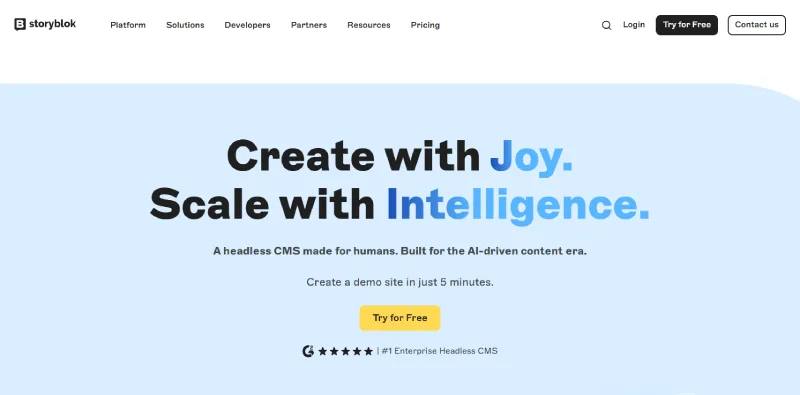
Best for: Teams needing both dev flexibility and marketer usability
Storyblok bridges the gap between developer control and marketer accessibility. Non-technical team members can create and optimize content using the visual editor, while developers maintain full control over the frontend performance. When your marketing team needs to move fast without breaking technical SEO implementations, Storyblok’s visual editing prevents the conflicts that typically arise between content creators and developers.
Key features:
- Block-based content structure with a visual editing interface
- Real-time visual preview and collaborative editing tools
- Multi-language content management and localization
- Headless architecture with traditional editing experience
- Developer-friendly APIs with a marketer-friendly interface
11. Enonic XP
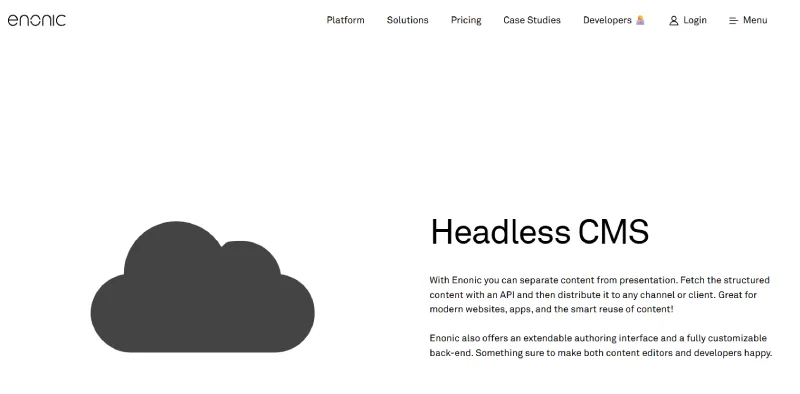
Best for: Hybrid delivery (traditional + headless)
Enonic XP adapts to your team’s workflow. Start with traditional page management and evolve to headless delivery as your needs grow. This flexibility prevents the platform from becoming a bottleneck as your SEO strategy matures. When you need the safety of traditional CMS editing with the performance benefits of headless architecture, Enonic XP’s hybrid approach eliminates the need to choose between control and speed.
Key features:
- Hybrid architecture supporting both headless and traditional delivery
- Progressive Web App (PWA) support and multi-channel publishing
- Strong developer ecosystem with extensive documentation
- Content modeling with SEO-friendly structure options
- Flexible deployment options from cloud to on-premise
Best CMS for Publishers & Content Creators
Content-focused platforms prioritize writing experience, publishing workflows, and reader engagement while maintaining strong SEO fundamentals.
12. Ghost
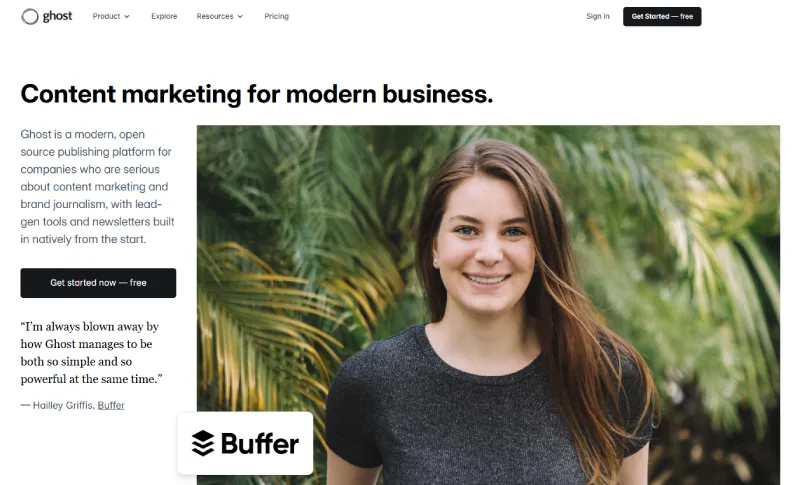
Best for: Bloggers, publishers, and membership sites
Ghost strips away everything that doesn’t serve content creation. Fast loading times, clean HTML, and built-in SEO essentials help your content rank without getting bogged down in complex features you don’t need. When publishing quality content consistently matters more than bells and whistles, Ghost’s streamlined approach keeps your team focused on what drives organic traffic: great content that loads fast.
Key features:
- Built-in SEO fundamentals (XML sitemaps, canonical URLs, meta tags)
- Clean, lightweight themes optimized for speed
- Integrated newsletter and subscription management tools
- Modern editor with SEO-friendly content structure
- Automatic social media optimization and sharing features
13. SilverStripe
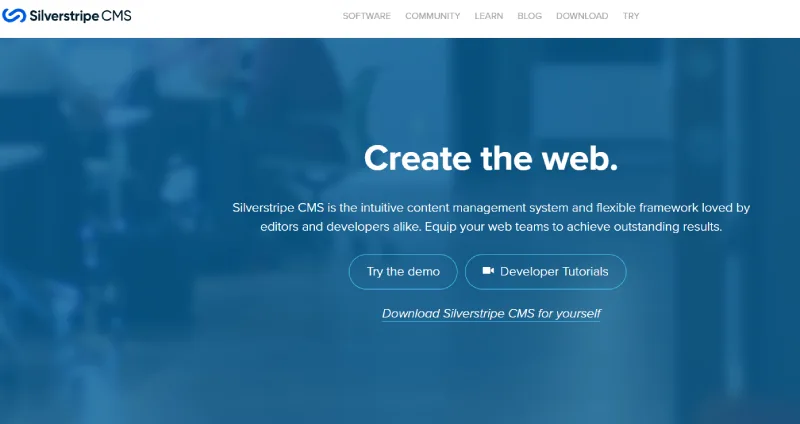
Best for: Lightweight, open-source publishing sites
SilverStripe produces clean, semantic HTML that search engines can easily crawl and understand. Its straightforward approach to content management means less bloat and better performance compared to feature-heavy alternatives. When you need reliable SEO performance without the complexity and overhead of enterprise platforms, SilverStripe delivers solid fundamentals that help content rank consistently without technical complications.
Key features:
- Clean HTML output with semantic markup structure
- SEO-friendly template system and URL management
- Lightweight codebase for fast page loading speeds
- Simple hosting requirements and easy maintenance
- Flexible content modeling without excessive complexity
14. Concrete CMS
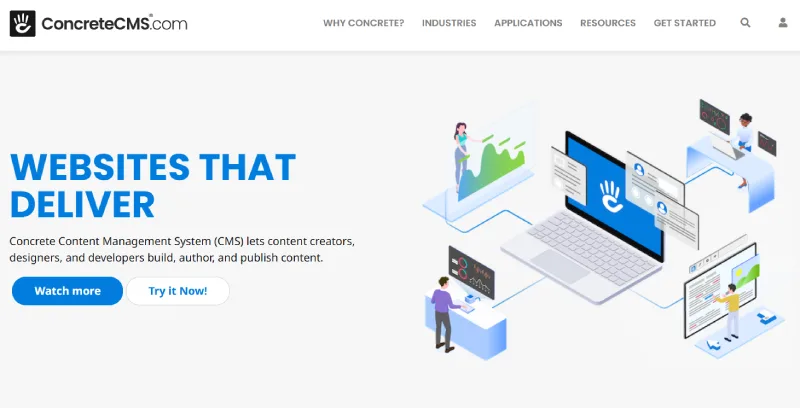
Best for: Non-technical editors
Concrete CMS lets content creators edit pages visually without breaking SEO fundamentals. The inline editing interface prevents the accidental SEO mistakes that happen when non-technical users work with complex admin panels. When your content team needs to update pages quickly without risking technical SEO implementations, Concrete’s user-friendly approach maintains search optimization while empowering editors to work independently.
Key features:
- Inline visual editing with SEO preservation safeguards
- Built-in SEO tools accessible to non-technical users
- Simple permission system preventing accidental SEO damage
- User-friendly interface requiring minimal training
- Automatic SEO best practices enforcement during editing
Choosing the Right CMS for Your Business
A CMS is the foundation that powers your website’s content creation, management, and delivery to users and search engines. The wrong choice can cost you months of development time, thousands in migration fees, and missed growth opportunities.
Step 1: Assess Your Team’s Technical Capabilities
Start with an honest evaluation. WordPress offers flexibility but requires maintenance skills. Shopify costs more but handles e-commerce without technical expertise. Match platform complexity to your team’s actual abilities.
Step 2: Define Your Content Volume and Growth Trajectory
Publishing five blog posts monthly? Ghost works perfectly. Managing 10,000 products across multiple categories? You need Magento or Shopify’s enterprise features. Building globally in multiple languages? Consider Drupal or TYPO3’s advanced localization.
Step 3: Set Your Budget and Timeline Constraints
Factor in the total cost of ownership. Free platforms like WordPress require hosting, security, and maintenance investments. Premium platforms like Webflow include hosting but limit customization. Calculate three-year costs, not just setup fees.
Step 4: Plan for Future Scalability Requirements
Choose platforms that scale with success, not against it. The CMS that works for 1,000 monthly visitors might crumble at 100,000. Evaluate upgrade paths, performance limitations, and migration complexity before committing, since the most effective strategies for AI visibility enhancement depend on a CMS that can scale with your growth.
Schedule a free consultation to match your specific needs.
Future-Proofing Your SEO Strategy with the Right CMS
Investing in the right CMS today is a crucial step towards future-proofing your SEO strategy and ensuring long-term online success.
Search engines evolve fast. Core Web Vitals, mobile-first indexing, and AI-generated results punish slow, inflexible websites, reinforcing why investing in SEO remains critical no matter which CMS you choose. Your CMS must adapt quickly or rankings suffer. Headless platforms excel because they separate content from presentation, enabling rapid updates without full site rebuilds when Google changes requirements.
Pick a CMS for the next five years, not just today. AI Search Optimization requires flexible content delivery across multiple channels. Your platform is the foundation, but success demands consistent optimization and strategic execution.
Ready to dominate search results? Partner with our proven SEO experts and turn your CMS choice into a competitive advantage that drives real revenue growth.
Which CMS is best for SEO overall in 2025?
What is the best CMS for e-commerce SEO?
What is the best CMS for enterprise SEO?
Is WordPress still the best CMS for SEO?
What is the best headless CMS for SEO?
About the Author: Grace
Grace is a seasoned content strategist and writer with deep expertise in creating digital content that drives measurable business outcomes. She specializes in producing articles, guides, and campaigns that not only attract qualified leads but also improve user experience and strengthen brand authority. With a strong background in SEO and the emerging field of AEO (Answer Engine Optimization), Grace ensures every piece of content is optimized to perform across search engines, AI-driven platforms, and customer journeys. Her approach combines research, storytelling, and strategy—helping brands build trust, increase visibility, and convert readers into loyal customers.
View all posts →